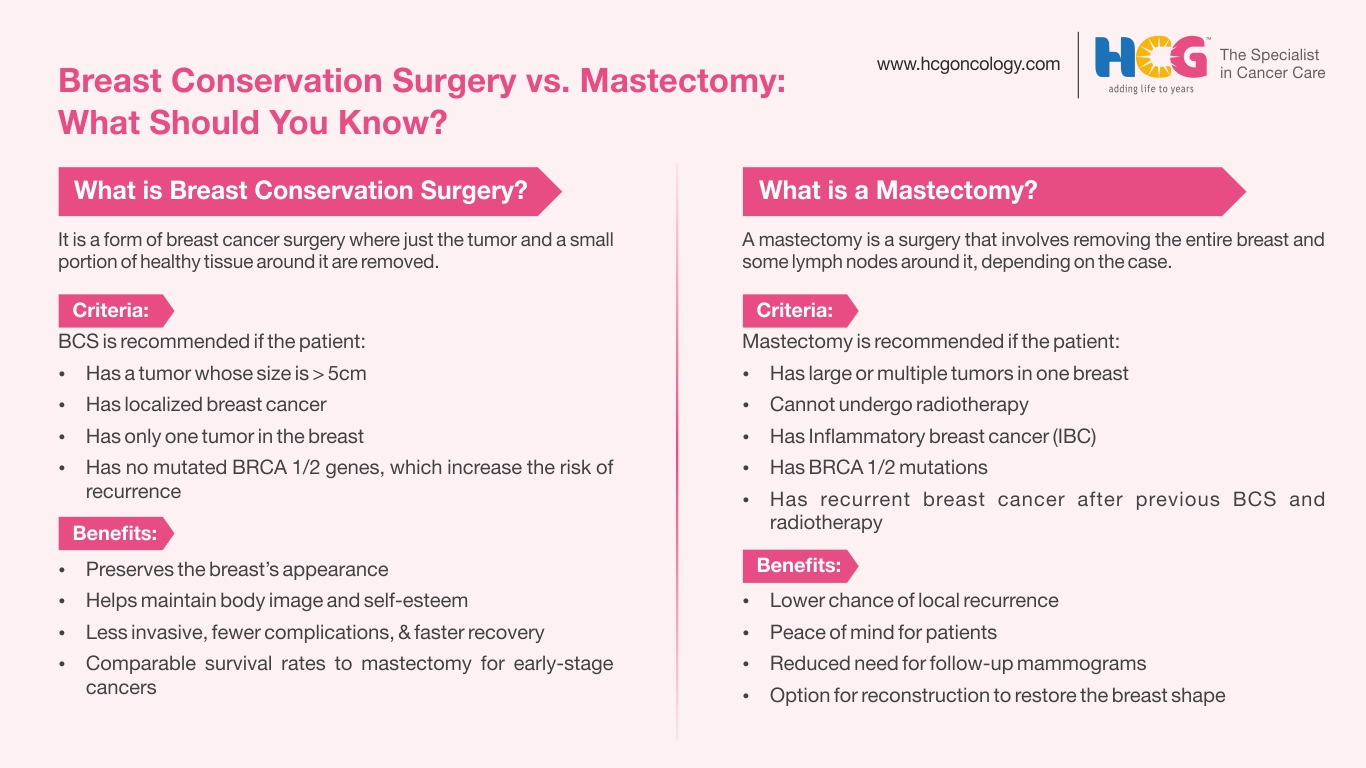
19 Dec, 2025
Feel free to reach out to us.

19 Dec, 2025

This article is medically reviewed by Dr. Bhavisha Ghugare, Senior Consultant - Surgical Oncology & Breast Oncosurgery, HCG Cancer Centre, Borivali.
When faced with a breast cancer diagnosis, one of the most critical decisions a patient may need to make is choosing between breast conservation surgery (BCS) and a mastectomy.
This choice can be daunting and emotionally charged, but understanding each treatment's facts, options, benefits, and considerations will empower patients to make informed decisions in consultation with their healthcare team.
In this blog article, we discuss breast-conserving surgery and mastectomy as effective surgical approaches to manage breast cancer cases.
Breast-conserving surgery (BCS), also known as lumpectomy or partial mastectomy, is a form of breast cancer surgery where just the tumor and a small portion of healthy tissue around it are removed. The goal is to eliminate cancer while retaining as much of the natural breast as possible.
In simple terms, breast conservation surgery is the best option for patients with stage I breast cancer, where the tumor size is less than 5 cm and the disease is localized to the organ.
Additionally, it is appropriate for patients who have only one tumor in one part of the breast and who are not at high risk of getting cancer again because they lack certain genes, such as BRCA 1/2, which cause this disease.
A mastectomy is a surgery that involves removing all the breast tissue and sometimes some lymph nodes around it. It’s a more aggressive form of breast cancer therapy often recommended in specific situations.
Mastectomy is suitable for:

The cost of lumpectomy vs. mastectomy varies based on geography, hospital, and whether reconstruction is involved. Generally:
For more information on the cost of lumpectomy and mastectomy at HCG, please reach out to our care team
When comparing breast-conserving surgery and mastectomy, the choice should be based on
In terms of lumpectomy vs. mastectomy survival rates, research shows no significant difference in long-term survival for early-stage breast cancer. However, mastectomy vs. lumpectomy recurrence rates may vary slightly, with mastectomy offering slightly lower local recurrence in some cases.
Each individual’s condition is unique. Hence, patients need to have a detailed discussion with their breast surgical oncology team about their condition, concerns, and preferences, which will help the team devise the best possible treatment plan.
The debate of breast conservation surgery vs. mastectomy is not about which is better, but which approach is best for the patient.
While lumpectomy (or partial mastectomy) offers the benefit of preserving your natural breast with similar survival outcomes, mastectomy provides a more definitive removal of cancerous tissue, sometimes eliminating the need for further treatment.
These two approaches play a pivotal role in effective breast cancer therapy.
That said, for successful health outcomes, one must prioritize early detection, timely treatment, and effective follow-up care.

Dr. Bhavisha Ghugare
Senior Consultant - Surgical Oncology & Breast Oncosurgery
MBBS, MS (General Surgery), Fellowship in Breast Cancer Surgery
Dr. Bhavisha Ghugare is a highly experienced breast cancer consultant and oncoplastic surgeon with over 16 years of experience. She is available for consultations at HCG Cancer Centre, a well-known cancer hospital in Borivali. She specializes in breast surgical oncology, and her areas of expertise include family history risk assessment, genetic testing, and breast screening, as well as breast conservation surgery, skin-sparing mastectomies, and prophylactic mastectomies. In addition, she is committed to caring for patients with benign and malignant diseases, as well as educating young women on how to reduce their risk of breast cancer.
Appointment Link: Book an Appointment with Dr. Bhavisha Ghugare.